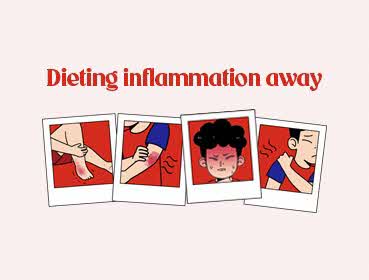Living life inflammation-free, part 1
Recognising the signs of inflammation and fighting back
Inflammation is a natural response of the body's immune system to protect and heal itself from harmful stimuli. When injury or infection is detected in the body, it triggers a sequence of events that result in inflammation.
This process is crucial for the body's defence mechanism, but in some cases, it can become chronic and lead to various health problems — including heart disease, diabetes, cancer and autoimmune disorders.
The classic signs of inflammation
When inflammation occurs, the body displays five symptoms: redness, swelling, heat, pain, and loss of function. These signs are the body's way of communicating that something is wrong and help to localise the affected area.
Inflammation happens when the immune system releases chemicals such as cytokines and histamines to the affected area. The signs of inflammation are a result of a reaction to these chemicals.
- Redness is caused by the expansion of blood vessels in the affected area creating a reddish appearance.
- Swelling occurs due to fluid build-up in tissues either throughout the body or in the affected area.
- Heat is caused by increased blood flow that causes the area to become warmer than usual.
- Pain is experienced due to the release of chemicals that stimulate nerve endings causing them to be more sensitive and trigger pain signals.
- Loss of function is the impaired ability to move or use the affected body part due to a combination of the other signs.
By addressing the underlying causes of inflammation and opting for a healthy lifestyle, we can reduce the risk of developing chronic conditions.
Anti-inflammatory foods to have in your diet
Eating foods that combat inflammation can be an effective way to manage your health. Here are the top five anti-inflammatory foods:
- Tomatoes are full of powerful antioxidants like lycopene and vitamin C to fight inflammation.
- Fatty fish like salmon, mackerel, and sardines are some fish that are rich in Omega-3 fatty acids which are potent against inflammatory chemicals.
- Berries such as blueberries, strawberries, and raspberries are filled with antioxidants that help fight inflammation. They are also a great source of fibre, vitamins, and minerals.
- Leafy greens like spinach, kale, and lettuce are excellent sources of anti-inflammatory compounds that support overall health.
- Extra virgin olive oil contains oleocanthal, which has anti-inflammatory properties similar to ibuprofen. It is also rich in monounsaturated fats, which are beneficial for heart health.
Living healthily through balance
A balanced diet rich in anti-inflammatory foods plays a significant role in managing inflammation. Other factors such as regular exercise, stress management and adequate sleep also contribute to reducing inflammation in the body.
Don’t belittle the chronic state of inflammation – it can lead to numerous health problems, including heart diseases.
By making better informed dietary choices and ensuring you have the right health insurance coverage, you can take better care of your health.
Let us match you with a qualified financial representative
Our financial representative will answer any questions you may have about our products and planning.








